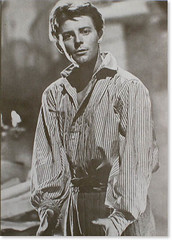Gérard Philipe is Julien Sorel in the film adaptation by Claude Autant-Lara
Is self-loathing the key to understanding Julien Sorel, the anti-hero of Stendhal’s The Red and the Black?[1], is the question I asked myself last night.
The American literary critic Hayden Carruth (R.I.P. 10 days ago) seems to confirm my suspicion by comparing him to Antoine Roquentin of Sartre’s Nausea . He wrote in 1959 of the way that “Roquentin has become a familiar of our world, one of those men who, like Hamlet or Julien Sorel, live outside the pages of the books in which they assumed their characters. . . . It is scarcely possible to read seriously in contemporary literature, philosophy, or psychology without encountering references to Roquentin’s confrontation with the chestnut tree, for example, which is one of the sharpest pictures ever drawn of self-doubt and metaphysical anguish.”
“Certainly, Nausea gives us a few of the clearest and hence most useful images of man in our time that we possess; and this, as Allen Tate has said, is the supreme function of art.” –Hayden Carruth


I’m fascinated by your interest in this novel, which I found almost madly disorganized, like a web spun by a spider on LSD. I understood the two women well enough, and thought that Stendhal drew them skillfully, but at least for me Julien became less and less real as the novel went on, a man disappearing into his own event. And the number of chapters that are simply “phoned in” is shocking. I kept thinking that at least Berlioz’ Symphonie Fantastique — an utter parallel — lasts for less than an hour, and at least musically is more coherent.
Now I’ve put my foot in it, no?
a friend recently gave me “Nausea” for my birthday and even though I liked it at first I found it increasingly hardgoing. your link to The Red and the Black makes me think I would like that book more
Nurse,
From what I know of your tastes, you’ll love The Red/Black novel. And I totally understand your reluctance towards towards Nausea, I consider it a curiosum but would not think of reading it cover to cover.
RJ,
Now I’ve put my foot in it, no?
Not exactly, you’ve put your finger on it. It’s exactly how I feel, Julien is so unpredictable, but maybe that’s a bit the charm of the novel, that you can never figure him out.
a man disappearing into his own event
well put
Berlioz’ Symphonie Fantastique — an utter parallel —
I’ll check, I thought SF was about a heroin addicted man, maybe an unrequited love story, no?
J
Julien is unpredictable because he is a real character. Stendhal was a realist. Julien is not a figure from novels, like those referenced in your earlier post. The brilliance of Stendhal’s achievement is evident in that we still find him surprising! We expect he will “sell out” and join the establishment, or evade destruction in some self-serving way. He doesn’t!!
How can one say that chapters were “phoned in?” For me, one of the high points of the book is the chapter cited at length in Auerbach’s book, Mimesis, in which the stultifying atmosphere of a bourgeois drawing room is evoked with such precision, it makes my head ache just thinking of having to be there and listen to the idiotic small talk. S knew what he was doing!
I love Berlioz, but I cannot see the parallel at all.
Oh, yeah…I meant to say that any comparison of Le Rouge et le Noir with those boring “philosophical” novels by Sartre is way off! Whose books would YOU rather read?